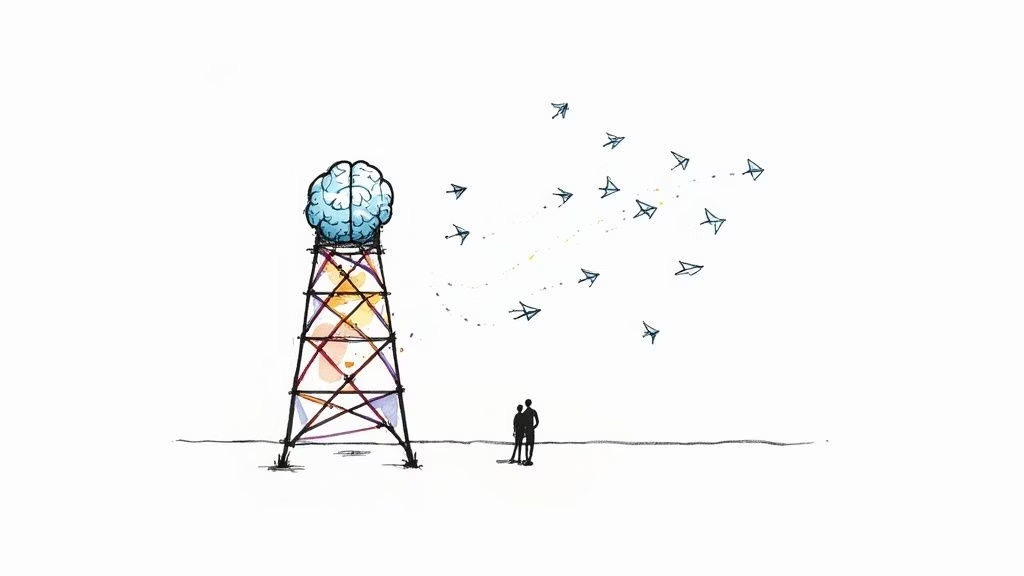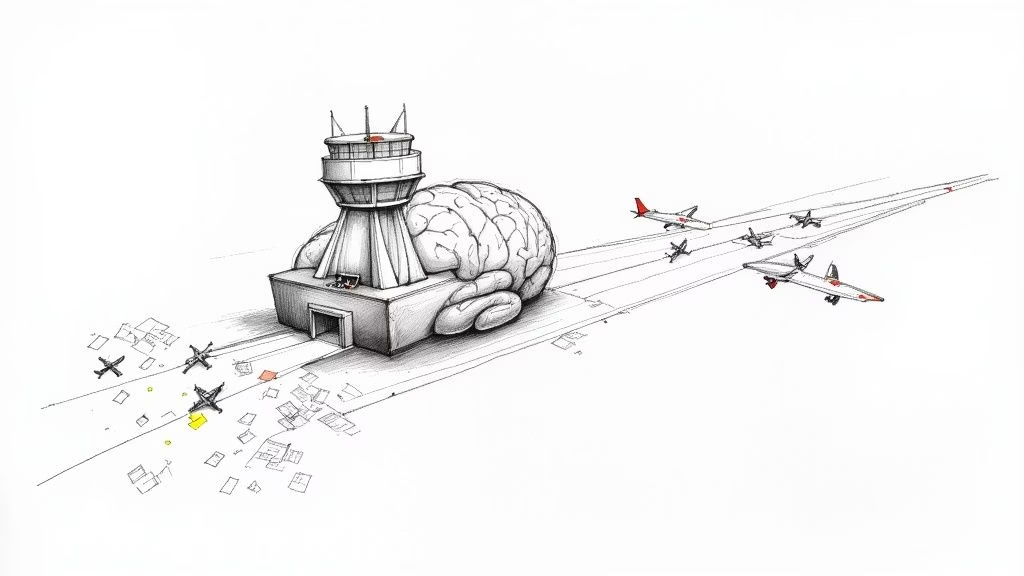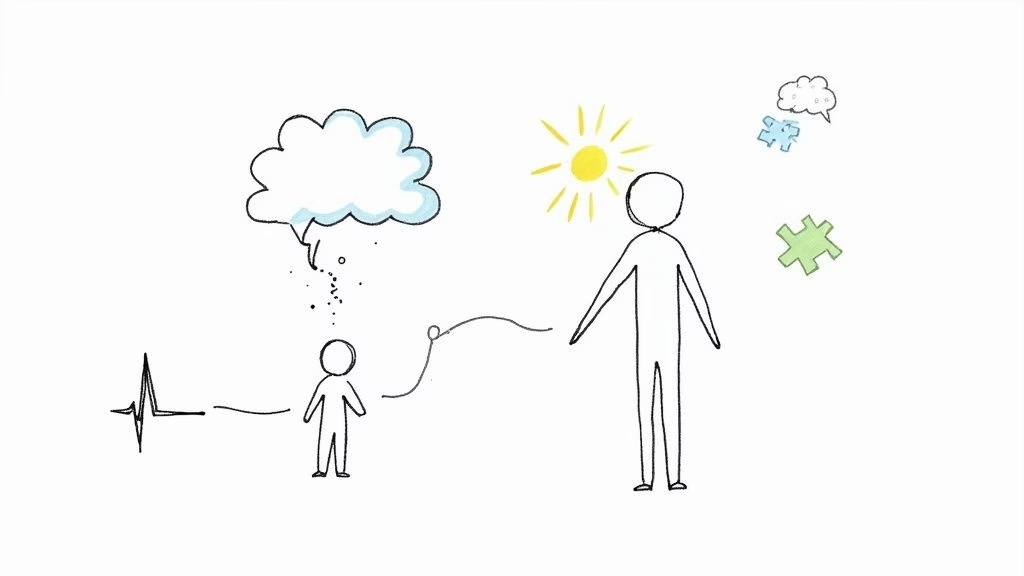Knowing how to improve self-awareness is really just about understanding your own thoughts, feelings, and actions. For teens and young adults, this isn't just some mental health buzzword—it's a practical skill. It's what helps you manage school, relationships, and whatever comes next with a lot more confidence.
Learning this skill is the first step toward breaking cycles of procrastination and finally feeling like you're in the driver's seat of your own life.
Why Self-Awareness Is Your Secret Superpower
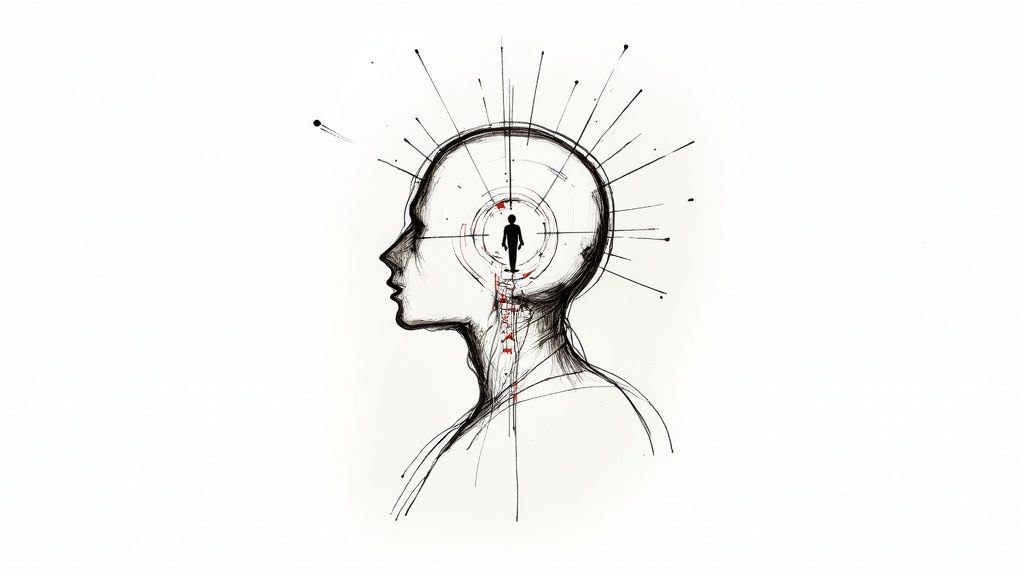
Let's be real—life as a teenager or young adult can feel like a constant balancing act. Juggling schoolwork, social pressures, and trying to figure out the future is a lot to handle. Self-awareness is the tool that helps you understand why you feel overwhelmed, why you keep putting off that big project, and what you actually want out of life.
It’s not about being self-critical; it’s about being self-aware. This skill is the foundation for everything, from boosting your motivation for school to building stronger friendships.
When you start checking in with yourself, you begin to notice the patterns behind your habits. You might realize you don't procrastinate because you're "lazy," but because you're afraid of not doing the assignment perfectly. That kind of insight is a total game-changer.
To really get a grip on this, it helps to break self-awareness down into its core parts. Think of them as the pillars you'll build on.
Core Pillars of Self-Awareness
| Pillar | What It Means for You |
|---|---|
| Emotional Awareness | Recognizing your feelings and understanding why they show up. |
| Values & Beliefs | Knowing what truly matters to you and what principles guide your choices. |
| Strengths & Weaknesses | Honestly seeing what you're good at and where you need to grow. |
| Habits & Patterns | Identifying the automatic behaviors that shape your day-to-day life. |
| Impact on Others | Understanding how your words and actions affect the people around you. |
Each of these pillars gives you a different lens through which to see yourself more clearly. We'll be diving into practical ways to strengthen every single one.
The Self-Awareness Gap
Here’s an interesting twist: most people think they have a pretty good handle on themselves, but the reality is often different.
Research shows a huge gap between how we see ourselves and the truth. While 85% of people believe they are self-aware, objective studies suggest only about 15% actually are. This just shows that building self-awareness is a skill that takes real, active effort. It doesn't just happen. If you're curious, you can learn more about the growing focus on personal development tools designed to help bridge this gap.
Self-awareness isn't a one-time achievement. It's an ongoing practice of checking in with yourself honestly, especially when things feel tough or confusing.
For young men and teen boys who are struggling, developing this skill is particularly important. It gives you a way to understand complex emotions and pressures without judging yourself for having them. Resources like men's groups and teen support networks offer spaces to explore these feelings and build a stronger sense of self alongside others who just get it.
Looking inward and asking for support isn't a sign of weakness. It's a sign of strength.
Your Practical Toolkit for Building Self Awareness
Building self-awareness isn’t something that just happens to you. It's an active process. It’s about more than just thinking about yourself; it’s about rolling up your sleeves and using specific tools to uncover your patterns, understand what drives you, and see yourself more clearly.
Think of these techniques as experiments, not exams. There's no pass or fail here. The only goal is to discover what works for you and helps you connect with yourself in a way that feels genuine. For a lot of people, mixing and matching different approaches is what really clicks.
This whole process is about laying a foundation. Once you start understanding your inner world, you can make choices that actually line up with your values. And when you do that, your connections with other people naturally get stronger and more meaningful.
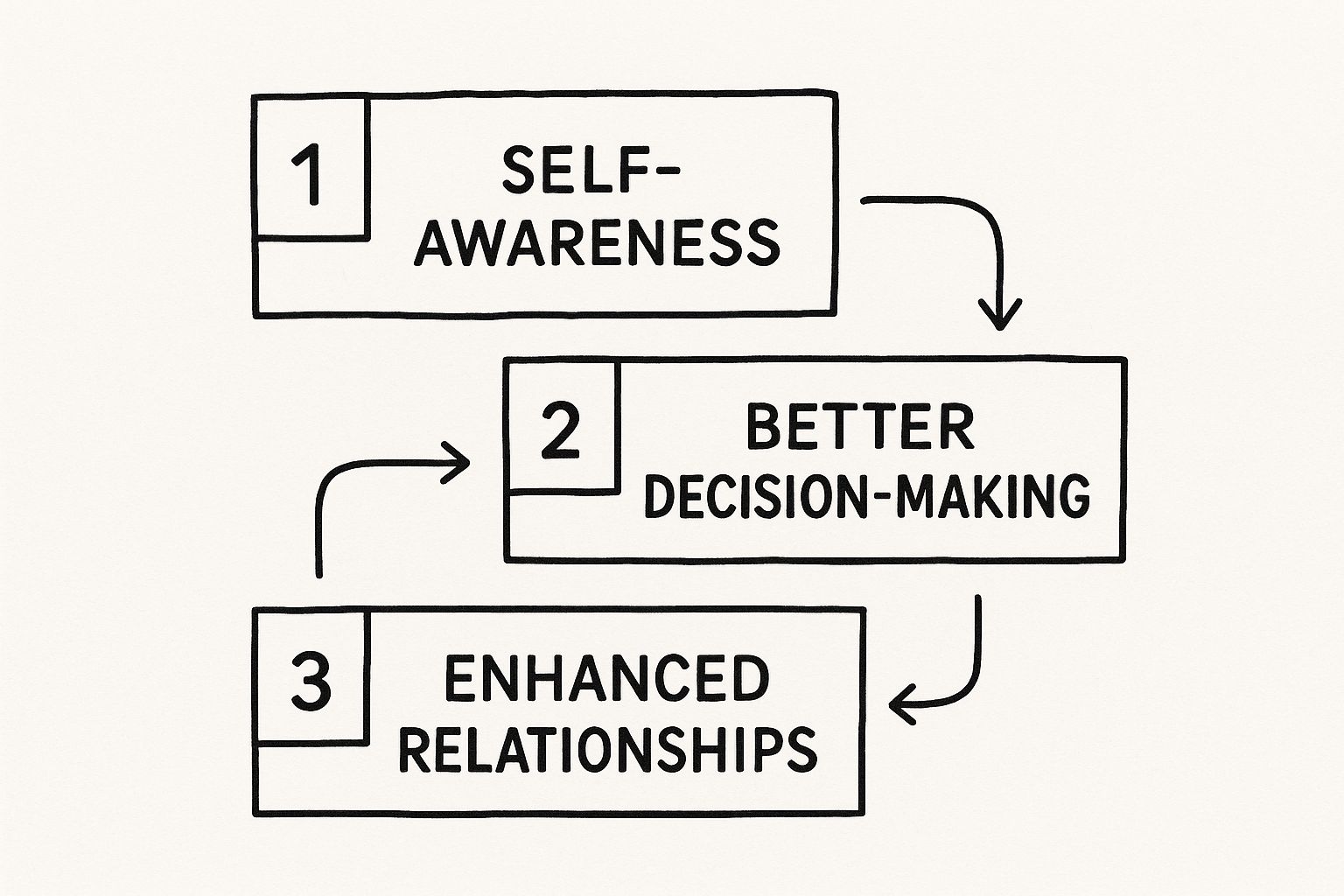
A Simple Meditation Guide for Teens
Meditation sounds way more complicated than it is. At its core, it's just the practice of focusing your attention. It's a powerful way to tune into your thoughts and feelings without getting caught up in them. If you’re stuck procrastinating or can’t find the motivation for school, even a few minutes can completely reset your focus.
Here’s a simple 3-minute meditation you can do literally anywhere:
- Find a comfortable seat. Sit upright in a chair, feet flat on the floor. You can close your eyes or just soften your gaze, looking at a spot on the floor a few feet ahead.
- Focus on your breath. Don’t try to change how you’re breathing. Just notice it. Feel the air coming in through your nose, filling your lungs, and then leaving your body. Simple as that.
- Gently bring your mind back. Your mind is going to wander. That’s what minds do. When you notice your thoughts have drifted off, just gently guide your focus back to your breath. Every time you do this, you're building your awareness muscle.
The point of meditation isn’t to have an empty mind. It’s to become an observer of your thoughts, realizing they come and go without defining who you are.
Resources for Teen Boys and Young Men
For young men, trying to figure out who you are while dealing with what society expects can feel pretty isolating. A huge part of building self-awareness is finding a safe space to connect with other guys who get it.
Joining a community can be a game-changer. Men's groups or youth programs offer a structured place where you can talk openly and build a real support system. These aren't just gripe sessions; they're places to develop emotional tools and resilience. If you're looking for more ways to grow, check out these insightful personal growth activities.
Organizations focused on teen mental health are also great places to look. They have online forums, articles, and confidential help lines made just for teens. Finding the right support can make all the difference and show you that you're not the only one going through it. A great starting point for anyone wanting more structured guidance is this resource on how to develop self-awareness.
Tips for Parents
As a parent, your job isn't to fix anything, but to create an environment where your teen feels safe enough to explore their own inner world. It's about holding space, not forcing solutions.
Here are a few things that can help:
- Practice active listening. This is huge. Instead of jumping in with advice, just listen. Ask open-ended questions like, "What was that like for you?" to encourage them to dig a little deeper on their own.
- Model emotional honesty. Talk about your own feelings in a healthy way. When you show that it’s okay to be vulnerable or frustrated, you make it easier for them to do the same.
- Validate their feelings. You don't have to agree with their perspective to acknowledge how they feel. A simple, "That sounds really frustrating," shows that you hear them and you care. It lets them know their feelings are valid.
Navigating School Motivation and Procrastination
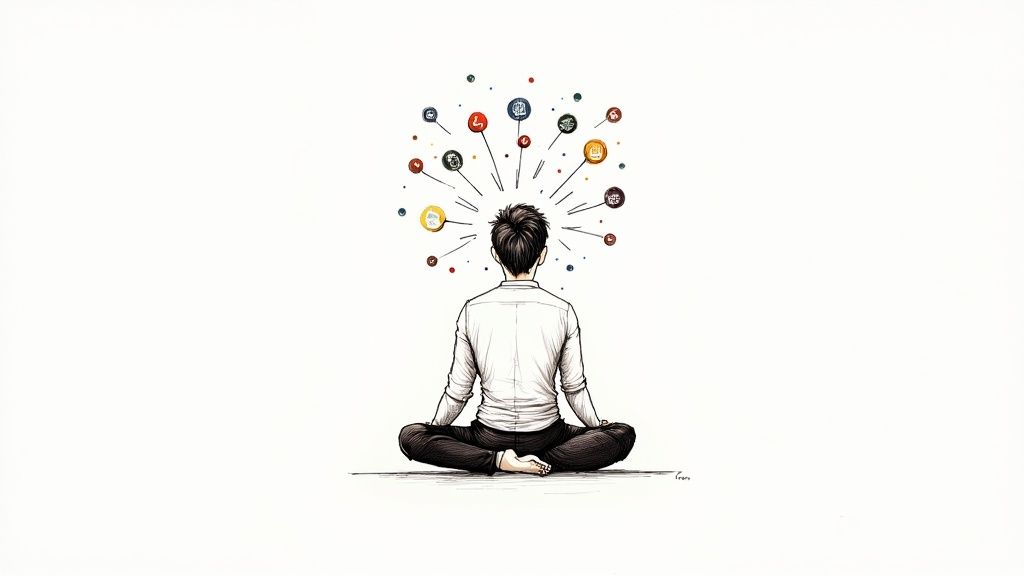
We’ve all been there—staring at a blank page, the deadline for a huge essay looming, and feeling completely stuck. It’s so easy to call this feeling laziness, but I’ve learned that procrastination is almost never about being lazy. It’s usually a sign that something deeper is going on.
Maybe you’re terrified of failing, or the project just feels so massive that you don’t know where to start. Maybe the subject just doesn’t click with you. This isn’t just a roadblock; it's a clue. Getting real about why you’re avoiding the work is the first real step toward getting back on track.
This idea of self-awareness has blown up recently. The pandemic really put a spotlight on mental resilience. A Pew Research Center survey found that over 80% of U.S. adults felt there were important life lessons to learn from the experience. That global shift has made practices like self-awareness a core part of handling life’s pressures, including the stress of school. You can read more about this growing trend in personal development here.
Turning Awareness into Action
Once you have a hunch about why you’re procrastinating, you can finally pick a strategy that actually helps. It’s all about working with your brain, not fighting against it. For instance, if you're feeling overwhelmed by a big assignment, try connecting it to something you actually care about.
Even if you're still figuring out your bigger goals, you can start by asking yourself a few questions:
- How does finishing this help me get closer to something I want, like getting into a specific college or even just feeling proud of myself?
- Is there one tiny part of this topic I’m genuinely curious about?
- What skill can I practice here (like time management or research) that will actually help me down the road?
Finding a way to link a boring task to a bigger purpose can breathe life into it. For some, building these skills works best with more direct support. If you find yourself constantly struggling to organize big projects and hit deadlines, looking into executive function coaching can offer you specific, personalized strategies to build those essential skills for school and beyond.
Practical Strategies to Break the Cycle
Awareness is the starting point, but you need some real tools to actually make a change. These methods are simple but incredibly effective for getting unstuck.
The 5-Minute Rule
This one is a classic for a reason. Just commit to working on the task for five minutes. That’s it. More often than not, starting is the hardest part. After five minutes, you’re free to stop, but you'll probably find you've built just enough momentum to keep going.
Task Batching
Instead of jumping between random things, group similar small tasks together. Knock out a few emails, organize your notes for one class, and outline a single paragraph all in one focused session. It makes your to-do list feel way less chaotic and much more doable.
The goal isn't to eliminate procrastination forever. It's to build the self-awareness to recognize when you need a genuine break versus when you're avoiding a task out of fear or overwhelm.
Ultimately, learning to manage your motivation in school is a huge part of your journey toward knowing yourself better. When you start treating procrastination as a signal instead of a personal flaw, you build the resilience and insight to handle whatever school—and life—throws at you. This is how you start building a stronger, more confident relationship with yourself.
Resources and Support for Young Men
Figuring things out on your own is a huge part of growing up. But building self-awareness doesn't mean you have to go it alone. Far from it.
For young men, juggling the pressures of school, friendships, and what comes next can feel like a heavy lift. Learning to acknowledge you need support and then actually reaching out for it? That’s not weakness. It's a massive sign of strength.
Connecting with people who get what you're going through is one of the fastest ways to understand yourself better. It gives you a space to be honest, see things from a different angle, and realize you’re not the only one feeling this way. A solid support system is one of the most powerful tools you can possibly have.
Finding Your People
First things first, take a look around. Who are the people in your life you can actually trust? This could be a couple of good friends, a family member you click with, or a teacher or coach who has your back. A strong support system isn’t about having a huge circle; it’s about having a few people who will listen without jumping to conclusions.
Bringing this stuff up can feel awkward, I get it. But it doesn't have to be a big dramatic conversation. It can be as simple as, "Hey, I've been super stressed about exams lately, can we talk for a bit?" The people who lean in and really listen—those are your allies.
Beyond your immediate circle, there are some great resources out there designed to be safe spaces for guys to connect and grow.
- Men's Groups: Organizations like The ManKind Project have youth programs specifically created to build community among young men. These aren't stuffy, formal things; they're structured places to talk about real challenges and build emotional muscle with guys who are on the same path.
- Teen Mental Health Resources: Websites focused on teen mental health offer articles, forums, and even confidential support lines. A great one is The Jed Foundation, which provides tools and info designed for teens navigating their emotional health.
Building a support network is like having a mirror. It helps you see yourself and your situation more clearly through the eyes of people you trust.
A Simple Meditation Guide for Teens
Even with the best support system, you still need tools to manage what's going on inside your own head. Meditation is a super practical way to calm down stress and just watch your thoughts without getting tangled up in them. This is especially helpful when you’re procrastinating on homework or just feel completely unmotivated.
Here's a quick meditation you can literally do anywhere, anytime.
- Get Comfortable: Find a chair, sit with your back straight, and plant your feet on the floor. You can close your eyes if you want, or just look down at the floor.
- Notice Your Breath: Don't try to change anything. Just pay attention to the feeling of your breath coming in and going out. That's it.
- Gently Refocus: Your mind is going to wander. It's what minds do. When you notice it's drifted off, just gently bring your attention back to your breath. Every single time you do that, you're building your awareness muscle.
This simple exercise creates a tiny bit of space between a feeling and your reaction to it. That space gives you more control, more clarity, and helps you handle whatever life throws at you with a little more confidence. It's a foundational skill for understanding your inner world.
A Guide for Parents Supporting Their Teen
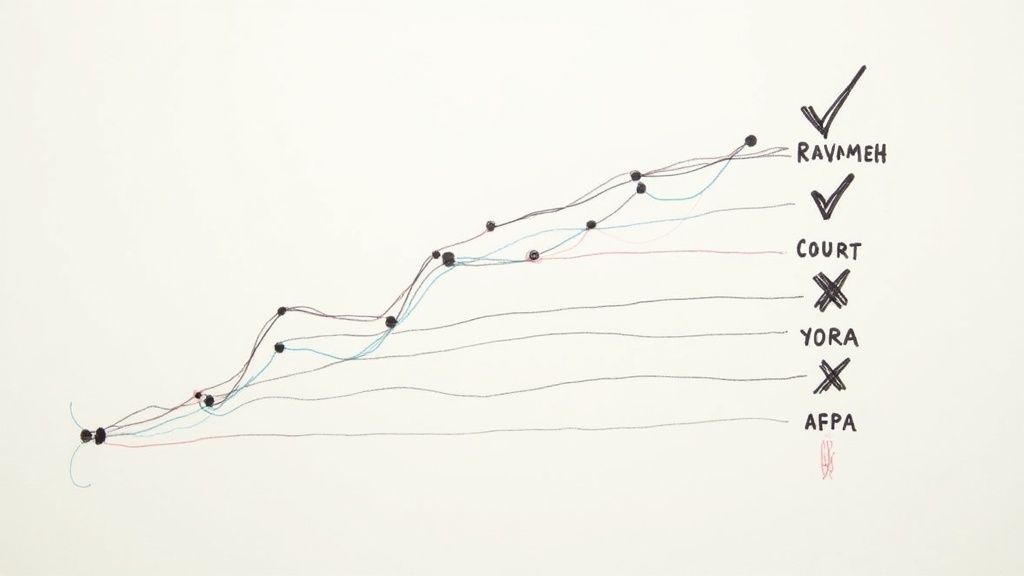
As a parent, your job isn't to have all the answers for your teen. It’s to create a home where they feel safe enough to find their own. One of the most powerful things you can do is foster an environment that encourages self-discovery and supports their journey toward self-awareness.
This whole process really starts when you shift from being a problem-solver to a curious listener. When your teen hits a wall—like procrastinating on a big school project—your first instinct might be to jump in with solutions.
Instead, just try listening. This small change can completely transform your conversations and build a partnership based on trust, showing them you value their own thought process.
Shifting the Conversation
Your words can either open a door or build a wall. When you move away from accusatory questions and toward empathetic ones, you create the space they need for honest reflection.
Think about these simple conversational shifts:
-
Instead of: "Why haven't you finished that assignment yet?"
-
Try: "That project seems tough. What's that been like for you?"
-
Instead of: "You seem upset about something."
-
Try: "I notice you've been quiet today. How are you feeling?"
These subtle changes validate their experience and encourage them to explore their own feelings about things like motivation and school pressures. For more strategies, our guide on empowering parents with coaching tools has a ton of practical advice.
The goal isn’t to extract information but to model how to process emotions. When teens see you approach feelings with curiosity, not judgment, they learn it's safe for them to do the same.
Finding Trusted Resources Together
Navigating mental health can feel overwhelming, but you don't have to do it alone. Exploring resources together can demystify the whole thing and reinforce that asking for help is a sign of strength, not weakness.
There are some incredible organizations out there offering support specifically for teens.
Top-Tier Resources for Teen Mental Health:
- The Jed Foundation: A go-to for comprehensive resources, tools, and support systems designed to help teens and young adults with emotional health and suicide prevention.
- The Trevor Project: Provides crisis intervention and suicide prevention services for LGBTQ young people under 25.
- Active Minds: A leading nonprofit that is changing the conversation about mental health on college and high school campuses.
The self-improvement market is projected to blow past $84 billion by 2034, which shows a growing recognition of the need for skills like emotional regulation and stress management. Yet, a huge barrier remains: 30-40% of people who could benefit hesitate because of stigma or doubts about whether the methods even work.
By exploring these resources with your teen, you actively help dismantle that stigma. You can read the full research about the self-improvement market's growth to see just how big this shift is.
Common Questions About Self Awareness
As you start digging into this work, some questions are bound to pop up. It's totally normal. Let's tackle the big ones so you can keep moving forward without getting tripped up.
What's The Difference Between Self Awareness and Self Consciousness
This is a huge one, and it's easy to get them mixed up, especially when you're a teenager. They can feel similar in the moment, but they’re actually polar opposites.
Self-consciousness is that feeling of being under a microscope. It’s all about what you think other people are thinking about you. It's an external focus, and it’s almost always driven by worry and a fear of being judged. It’s the voice in your head asking, "What are they thinking of me?"
Self-awareness, on the other hand, is an internal focus. It’s about turning your attention inward and just noticing what’s going on—your thoughts, your feelings, your reactions—without judging any of it. The question here is, "What am I thinking and feeling right now?"
Self-consciousness is rooted in a fear of what others think. Self-awareness is rooted in curiosity about yourself. One fuels anxiety; the other fuels growth.
For young guys, this distinction is critical. There's so much pressure to act a certain way or fit a specific mold, which can crank up self-consciousness to an 11. Building genuine self-awareness is what gives you the inner stability to deal with all that noise without losing track of who you actually are.
How Can This Help with Social Anxiety
Social anxiety often gets its power from those spiraling, negative thoughts that are classic self-consciousness. You walk into a room and your brain immediately starts serving up worries about saying the wrong thing, being awkward, or getting judged. It's exhausting.
Self-awareness acts like a circuit breaker in that cycle.
When you get better at noticing your anxious thoughts as they happen—without getting totally sucked into their drama—you create a little bit of breathing room. That space is everything.
So, next time you feel that wave of anxiety before a party or a presentation, you can try this:
- Notice the physical stuff: "Okay, my chest feels tight. Heart is pounding."
- Name the thought: "My brain is telling me 'Everyone is going to think I'm weird.'"
- Gently challenge it: "That's just a thought, not a fact. It's my anxiety talking. What's one small thing I can focus on right now instead?"
This won't make the anxiety vanish into thin air, but it shifts the dynamic. You go from being a passenger on a runaway train of emotion to being the observer watching it go by. Research has shown time and again that this kind of emotional regulation is a game-changer for managing anxiety and building a healthier mind.
What If I Try These Things and Still Feel Stuck
First off, it’s completely normal to hit a plateau. Building self-awareness is a practice, not a magic pill you take once. If you've been giving journaling, meditation, or feedback a real shot and still feel like you're spinning your wheels, it might be time to bring in some backup.
Reaching out for help isn't a sign of weakness; it's a sign of strength and self-respect. It means you’re taking your own well-being seriously.
Where to Turn for Help:
- School Counselors: These guys are an amazing first stop. It's confidential, they're trained to help with everything from school stress to social stuff, and they can point you toward other resources if you need them.
- Therapists or Coaches: Finding a professional who specializes in working with teens or young adults can give you a more structured, personalized game plan.
- Trusted Adults: Sometimes the best first step is talking to a parent, a cool uncle, a mentor, or another family member who has your back. They can be a huge ally in helping you figure out what's next.
For teen guys and young men, finding the right person to talk to is key. Things like men's groups or coaching programs designed specifically for young men can provide a space where you can be open and honest without worrying about being judged. The goal is to find someone who gets you and can give you practical tools that actually work. Don't be afraid to take that step.
At Andrew Petrillo Life Coaching, we provide personalized, one-on-one coaching to help teens and young adults navigate these exact challenges. If you're ready to turn overwhelm into action and build the skills for a confident future, let's connect. Schedule your free 20-minute discovery call today to see if it's the right fit for you.















